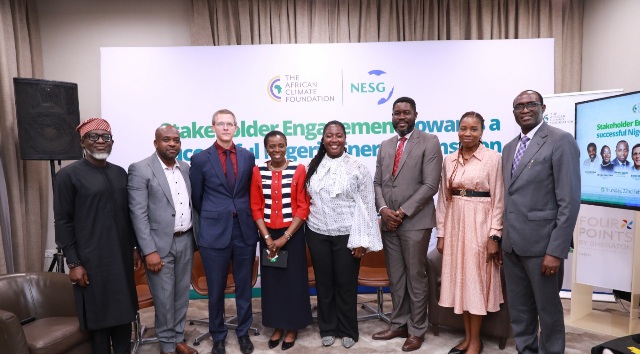The Nigerian Economic Summit Group (NESG) in partnership with the African Climate Foundation (ACF) held a “Private Sector Stakeholder Engagement Towards a Successful Nigeria Energy Transition” to strengthen public-private engagement around implementing the Nigerian energy transition plan and supporting the development of the carbon market to drive socio-economic improvement.
In her overview of the project, Mrs Dolapo Kukoyi, Managing Partner at Detail Commercial, said that the project will ultimately bring about information sharing and policy reforms that support interventions that drive energy transition and inclusive development, by unlocking opportunities in the energy sector and carbon market, stimulating climate change resilience, and unlocking private sector and employment opportunities, research, development, and economic growth. She also noted the importance of strengthening public-private engagement, whilst supporting interventions that drive socio-economic improvement.
Also, Mr Zira Quaghe of the African Climate Foundation in his opening remarks said that the organisation is concerned with climate finance and since 2022, they have entered 12 partnerships to boost energy transition and carbon finance.
Quaghe reiterated the need for Nigeria to adopt a paradigm for economic transformation as a way of increasing energy access, job creation opportunities and economic diversification.
He said 80% of the financing plan for energy transition should come from the private sector and the government should drive the policies while ensuring they set targets, pace, the regulatory and policy framework.
The Facilitator of the Energy Policy Commission of the NESG, Dr Segun Adaju, in his presentation on the Nigerian Energy Transition Plan, said that Nigeria launched her energy transition plan in 2022 which aims to lift 100 million Nigerians out of poverty and drive economic growth by bringing modern energy services to the total population.
He stressed that it will help manage the expected long-term job loss in the oil sector due to the reduced global fossil-fuel demand, even as Nigeria will play a leadership role for Africa by promoting a fair, inclusive, and equitable energy transition on the continent by streamlining existing and new government-related energy transition initiatives.
Dr Adaju further stated that some of the findings of the project revealed inadequate and high cost of financing, lack of political will and coordination among stakeholders, low levels of public awareness and Enlightenment and absence of capacity.
He also noted that misalignment of public and private sector Interests, absence of holistic policy frameworks and unfavourable enabling environment and policies as some of the challenges of the Nigerian Energy Transition Project.
He reiterated that the incentives required from the government to the private sector include Favourable Monetary & Fiscal Policies, Improved Coordination among Stakeholders and Enabling Business Environment.
In his presentation on the Carbon Market Landscape in Nigeria, the facilitator of the Sustainability Policy Commission of the NESG, Dr Eugene Itua said that the carbon market is high today because it serves as key leverage to access finance and meet Nigeria’s Nationally Determined Contributions. Furthermore, Dr Itua stated that only about 35% of stakeholders engaged are involved in sectoral projects such as clean cooking, solar farms, wind energy, street solar, gas projects, and energy efficiency projects in the voluntary carbon market (VCM) and that government can support participation through sufficient policy laws and frameworks, capacity building, tax waivers or tax holidays, and investment.
During the panel session, the president of Women in Energy Network, Ms Eyono Fatayi-Williams stated that it is important to build a framework that makes provision for women as they bear the brunt.
She stated that the major issue is capacity building and creating an enabling environment for homegrown solutions.
During the panel session, the Chief Executive Officer, of AllOn, Ms Caroline Eboumbou said that the carbon market is a potential source of revenue but companies need to know more about it, considering that companies need other potential sources of revenue necessitating a need to streamline the carbon markets in a way that it is beneficial for all.
Speaking in the same vein, associate Partner, Sahel Consulting, Mr Chinedu Agbara, who was represented by Mr Adekunle Adeoye said that to actualize the ETP, there is a need to explain the plan to the private sector and households, as such transition requires motivation for behavioural change.
He also mentioned the importance of tax breaks and subsidies for companies that adopt the energy transition plan, as essential in helping Nigeria reduce greenhouse emissions.
